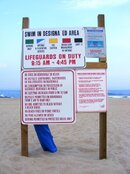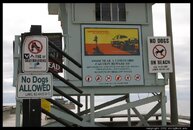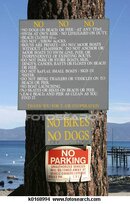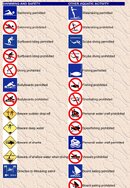This post is probably the one i most agree with oyou on. BZ for it. Any organizationoor procsss has its flawed outcomes.
What we have to decide is whether or not is .... Does our very few flawed outcomes crosss the reasonable persons threshold of out of control. If yes then control has to be placed at a higher authority or controling group. If no then we all have to get involved to reduce what few problems we have in a way that outsiders and insiders see the steps being taked as processes whose rooted in integrity and sincere application. We also have to accept that if 99% of all trainees follow common sence behaviors then we are a success and not a failure because of the 1% that will not conform. I for one will not associate with one who willfully destroys our diving invironment. i also understand that accidents happen and when such things accure one should exhaust all avenues at the lowest level before exclating to the control of others. Thanks for that post..
QUOTE=Mike Boswell;6112752]One of the trends in international scuba diving has been the protected areas where fish populations thrive and divers can enjoy a natural, unspoiled environment. Governments create and police these underwater parks and levy fees for park entry, local businesses and populations benefit from the visitor spending, and pretty much everyone has a legitimate interest in regulating what is done in them.
Today there are few rules in these wonderful places, but inevitably, I fear that a few people will do stupid things and kill themselves or others, lawsuits will be filed, businesses will suffer, and governments will have no choice but to step in and curtail everybody's freedom.
The only people who can prevent this scenario is the dive community itself. And the only way we can do it is by education - sharing our hard-won wisdom with the next generation of divers.[/QUOTE]
What we have to decide is whether or not is .... Does our very few flawed outcomes crosss the reasonable persons threshold of out of control. If yes then control has to be placed at a higher authority or controling group. If no then we all have to get involved to reduce what few problems we have in a way that outsiders and insiders see the steps being taked as processes whose rooted in integrity and sincere application. We also have to accept that if 99% of all trainees follow common sence behaviors then we are a success and not a failure because of the 1% that will not conform. I for one will not associate with one who willfully destroys our diving invironment. i also understand that accidents happen and when such things accure one should exhaust all avenues at the lowest level before exclating to the control of others. Thanks for that post..
QUOTE=Mike Boswell;6112752]One of the trends in international scuba diving has been the protected areas where fish populations thrive and divers can enjoy a natural, unspoiled environment. Governments create and police these underwater parks and levy fees for park entry, local businesses and populations benefit from the visitor spending, and pretty much everyone has a legitimate interest in regulating what is done in them.
Today there are few rules in these wonderful places, but inevitably, I fear that a few people will do stupid things and kill themselves or others, lawsuits will be filed, businesses will suffer, and governments will have no choice but to step in and curtail everybody's freedom.
The only people who can prevent this scenario is the dive community itself. And the only way we can do it is by education - sharing our hard-won wisdom with the next generation of divers.[/QUOTE]








